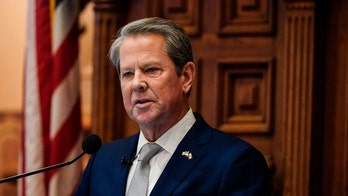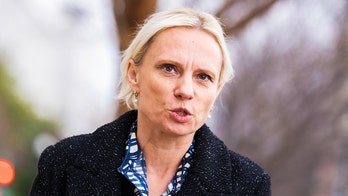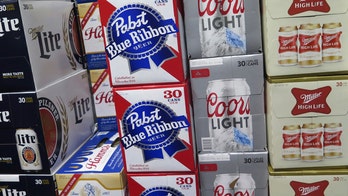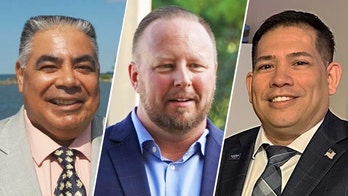Almost 10 years after their immediate predecessors promised immigration reform and four years into a bloody border drug war, success for President Obama's State Dinner for Mexican President Filipe Calderon may come down to just preventing gate crashers at their black tie dinner.
Calderon says he will push for immigration reform when he arrives Wednesday for his talks in the Oval Office. President Obama says a new Arizona law that requires police to ask about a person's immigration status if there's reason to suspect the person is in the country illegally is "misguided." But his hopes are not high the U.S. Congress will come up with a federal statute this year to replace it.
The two leaders will also discuss continued U.S. aid for the thousands of troops and federal police Calderon has deployed on the border to stop the flow of drugs headed North and guns going South. Nearly 23,000 people have been killed since Calderon launched the offensive in December of 2006 with more than a billion dollars in U.S. assistance, under a program called the Merida Initiative.
Meanwhile, White House Press Secretary Robert Gibbs says security procedures for the traditional State Dinner Wednesday night have been improved since Mr. and Mrs. Obama's first such dinner, in November. Then, a Northern Virginia couple, Michaele and Tareq Salahi, got in without an invitation, took pictures with the President and Vice President and posted them on Facebook that night. The party crash triggered Secret Service and Congressional investigations and some say it cost White House Social Secretary Desiree Rogers her job.
Former President George W. Bush initially placed immigration reform near the top of his agenda, visiting Mexico less than a month after taking office and honoring then Mexican President Vicente Fox with his first State Visit in September of 2001. Mr. Bush said the U.S. had no more important relationship than the one with Mexico, but the 9/11 attacks days after the visit reordered his priorities, and security concerns pushed immigration reform to the back burner. By the time it rose to the top of his agenda again, during Mr. Bush's second term, concerns about what some lawmakers saw as an amnesty provision and Mr. Bush's own low public approval ratings left him far short of the votes he needed in to stop a filibuster in the Senate.
President Obama faces a similar case of poor timing and slumping public support. He and his aides have said that the federal government's failure to enact comprehensive immigration reform prompted Arizona's law and that a federal statute would be preferable. But Mr. Obama has also warned Congress might not have the political appetite to take on immigration reform this election year. Republicans have warned moving the issue to the front of their "to do" list would cost their support on other matters, like financial regulatory reform.
White House officials say Presidents Obama and Calderon are likely to build on work done this year to open new border crossings and modernize existing ones. The goal would be to facilitate U.S.-Mexican trade, but even on that issue a sticking point will likely remain. Last year, the U.S. ended a pilot project that allowed Mexican trucks unfettered access to US roads and Mexico slapped tariffs on about $2.4 billion in US goods. Administration officials say Mexico has legitimate concerns but the U.S. has safety obligations to uphold. The issue is unlikely to be resolved this week.
Late today, Indiana Republican Senator Richard Lugar said the Merida Initiative still has "a long way to go" but he said the effort is "showing positive results and should be bolstered." Still, Lugar sees troubling times ahead. Lugar released a report that warns "As the violence increases, public criticisms of President Calderón’s strategy and of the Mérida Initiative grow in number and intensity."
Lugar will meet with Calderon on Thursday. That would be after the latest state dinner attendees (legitimate or crashers, if there are any) will have posted their pictures online. The Salahis, who allegedly crashed the Obama's first State dinner, still insist they were invited and say the White House owes them an apology. They won't get one. And they won't get "another" invitation. Gibbs, meanwhile, won't say what security changes have been made. He says "that would invite people to try to figure out how to evade them."




